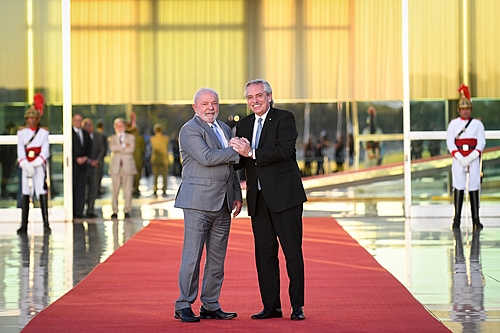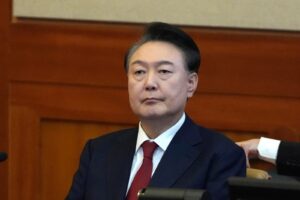
In just a few months of his mandate, there have already been two official meetings between President Luiz Inácio Lula da Silva (PT) and his Argentine counterpart Alberto Fernández (Frente de Todos). Brazil’s potential support for Argentina is, however, limited, according to experts, and can be reduced much more to a political gesture.
This would be due to the situation of the two countries. In Brazil, a government that has just begun, already crossed by internal turmoil, in contrast to a government in its last year in office and that was not able to respond to the economic and social crisis inaugurated by the neoliberal government that preceded it – in this case from Argentina. In March, the country’s annual inflation reached 104.3%.
Last week, in Brasília, Fernández and his economic management team met for four hours with Lula’s team to discuss trade between the countries. According to the executive secretary of the Ministry of Finance, Gabriel Galípolo, Brazil has lost around US$6 billion of space in the trade balance with Argentina in relation to China due to the lack of a financing mechanism for imports from the neighboring country.
https://www.youtube.com/watch?v=EJHbIjo5wbM
Argentina and Brazil are among each other’s main trading partners, competing only with China for the top spot in mutual imports and exports, which marks Brazil’s strategic interest beyond political alignment.
:: Argentina will carry out transactions without the dollar; Brazil and China are main partners ::
It was something President Lula wanted to emphasize in the press conference with Fernández at the end of the meeting. “What I want to make clear is that we are not having a discussion to help Argentina. We need to help Brazilian businessmen who export to Argentina and finance Brazilian exports, as China does for Chinese products.”
However, the expectation of the Argentine team was to return to the country with some more concrete financing agreement on the part of Brazil. He came back, yes, with a promise of support from Brazil to intercede for Argentina at the IMF and help to secure the guarantee for the credit line to finance trade between the countries, something that could come from the Novo Banco de Desenvolvimento, the bank of the Brics (acronym for the bloc comprising Brazil, Russia, India, China and South Africa), as suggested by Lula himself.
“[Alberto Fernández] arrived apprehensive, and will return calmer. True, no money. But with a lot of political disposition”, highlighted the Brazilian president alongside Fernández.
Brazil is committed to Mercosur and Argentina. We are going to do what we can to try to solve economic problems, to make Argentina a prosperous economy in our dear South America.
— Lula (@LulaOficial) May 3, 2023
“This trip was important, because it is on the path of this strategic alliance that is being resumed. But it did not yield as much to Fernández as expected,” said doctor in social sciences Amílcar Salas Oroño, an Argentine researcher at the Latin American Strategic Center for Geopolitics (Celag). . “We have to see how it goes. The political agendas of both presidents are under strong media pressure”, he pointed out.
Oroño recalled the distance adopted by the Brazilian government after the promise to finance the construction of the Néstor Kirchner gas pipeline through the National Bank for Economic and Social Development, the BNDES. The proposal to finance the work that would take unconventional gas from Patagonia to southern Brazil was widely publicized – and criticized by those who highlighted that Argentina is just a debt-ridden country – after Lula’s first official trip as president-elect, in January, whose chosen destination was precisely Argentina.
Finance Minister Fernando Haddad (PT) gave the signal of distancing before the Federation of Industry of the State of São Paulo (Fiesp), still in January. “These are projects that are sustainable from an economic point of view and that eventually won’t even need public funding. I think that Vaca Muerta is a project that perhaps dispenses with this type of funding,” said the minister, as reported by Agência Brasil.
“As much as the Brazilian government can give political support and show solidarity with the Argentine government regarding the renegotiation of the debt with the IMF, the possibility of the Brazilian government finding other contributions to Argentina, at this moment, is very small”, observes Cordeiro.
The support, however, gained practical contours this Thursday (11), when Haddad met with US Treasury Secretary Janet Yellen in Japan, in a meeting prior to the G7 meeting. “I brought up this problem because Argentina is a very important country in the world and, particularly, in South America. The solution for Argentina passes through the IMF. If Brazil and the US are together in this support, this can make things much easier. to Argentina,” said Haddad at the time. “She [Yellen] He was even surprised that I brought this subject up here. One of the reasons President Lula is coming to the G7 is to address this issue. For us, it is essential that this problem be solved”, continued Haddad.
:: Dutch PM praises Lula for peace efforts in Ukraine ::
With regard to the guarantee through the Banco do Brics for the credit line between Argentina and Brazil, Lula proposed changing the statute of the body – now chaired by Dilma Rousseff –, since the bank of the Brics serves only the member countries of the bloc. Another possibility would be the inclusion of Argentina as a member of the bloc, a long-standing discussion that also includes other countries.
“It is increasingly common to hear the strengthening of the Brics discussed, not just with the inclusion of Argentina, but Indonesia, Iran, Saudi Arabia,” Cordeiro points out. “There is a maturation within the leaders of the Brics to enlarge the bloc. I think that for August, on the eve of the meeting in South Africa, we will have more news in this process”, he foresees.
On the 29th of this month, Fernando Haddad was tasked with taking the proposal to the meeting of finance ministers from the Brics countries to contemplate the agreement under discussion on the credit line between Brazil and Argentina. The perspective of regional integration and recovery of commercialization between partner countries remains as a horizon in this beginning of the Brazilian government’s mandate, in dispute with the pressure of the economic sector and the hegemonic media in both countries.
“Often it is difficult to resolve the question of integration as something more solid, that is not reduced to bilateral meetings, and that is a permanent, sustained and regular work”, emphasizes Oroño. “We need more permanent and daily ties because the problems are heavy, especially in the case of Argentina. But it is also a benefit for Brazil to have a partner to accompany it in its new international role.”
Editing: Nicolau Soares
Source: www.brasildefato.com.br

